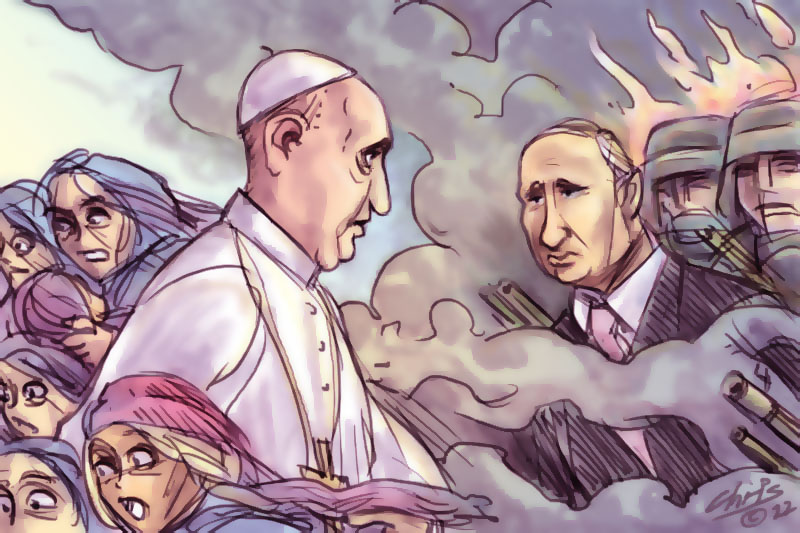Pope Francis has taken some unusual steps in the past two weeks. First, he crossed Rome to the Russian embassy where he personally ‘expressed his concern about the war’ then just begun in Ukraine. Second, he called Ukraine’s President Zelenskyy to communicate his ‘most profound pain’ for the country’s suffering.

More recently, on 6 March, he went further: ‘In Ukraine, rivers of blood and tears are flowing. This is not just a military operation but a war which sows death, destruction, and misery…In that martyred country the need for humanitarian assistance is growing by the hour…War is madness, please stop’, he implored.
In the past few days Pope Francis has taken to twitter, writing with greater frequency and more urgency in both English and Russian. ‘Never war! Think first about the children, about those who are deprived of the hope for a dignified life: dead or wounded children, orphans, children who play with the remnants of war…In the name of God, stop!’
These several acts have marked an important break with Vatican diplomatic protocol. Ambassadors normally come to the pope, not he to them. Equally, popes since Benedict XV during World War One have strived to inculcate an impression of their neutrality. Much of the Vatican’s diplomatic nexus has been built up and tolerated by Catholic and non-Catholic powers on the basis of that apolitical ideology.
Yet, here, Francis, even as he sustains the papacy’s now traditional opposition to all forms of war and its emphasis on the extreme suffering war brings, especially to the innocent, has taken a different, more partisan approach which he and others must feel is justified. His consolatory words to Ukraine’s president and his implied rejection of Russia’s description of its actions as a mere ‘military operation’ will have been inflammatory to President Putin.
'His consolatory words to Ukraine’s president and his implied rejection of Russia’s description of its actions as a mere ‘military operation’ will have been inflammatory to President Putin.'
The effects of that are unpredictable. Neither Francis, nor the rest of us, can know how his words or gestures will shape the fate of any Catholics who come under Russian control, nor how they might impact his advocacy for humanitarian decency and compassion.
Nor can he know their effect on the fragile oecumenical rapprochement between the Catholic and Orthodox leaderships which has consolidated since Paul VI’s historic meeting with the Greek Patriarch Athenagoras in Jerusalem in 1964.
In the short term, the Russia-Ukraine conflict has divided Orthodox Christianity against itself, as my ACU colleague Jonathan Zecher points out here. But in Christian history intra-confessional conflicts have had a habit of spilling wider before they are contained.
Moreover, certain interpretations of Eastern Orthodoxy are inherently wrapped up in the project of Russian imperialism, such that it may not matter that Roman Catholicism no longer has much to do with any ‘Western imperialist’ counterpart.
Francis will certainly have been under pressure from Catholic bishops in Central and Eastern Europe to take the strongest possible stand against Russia. Indeed, some Polish bishops have already gone much further in their remarks than even Francis was prepared to do via most recent words.
Stanislaw Gadecki, the Archbishop of Poznan, wrote to the Russian Patriarch Kirill in threatening, even apocalyptic terms earlier this month: ‘The time will come to settle these crimes, including before the international courts…However, even if someone manages to avoid this human justice, there is a tribunal that cannot be avoided.’
Bishops like Gadecki no doubt remember the role that John Paul II played in the fight against Communism in the 1970s and 1980s. However, like Francis, John Paul, as pope, was careful to temper his confrontations with the Soviets so they were not too overt. He did not want them to worsen the oppression that others were enduring.
In some ways Francis faces a more difficult and complex challenge than John Paul’s during the 1980s — not because there is any greater moral equivalence between Russian aggression and Ukrainian defence now than there was between Capitalism and Communism then.
Rather, it is because so many parties have been caught unawares by the speed of events and the lack of contingency planning for different scenarios has increased the risks both of immediate humanitarian disasters and also that events could spiral out of everybody’s control.
Even by going as far as he has done, Francis is placing the papacy’s reputation for neutrality — so hard won by Benedict XV — on the line, creating conditions for unpredictable outcomes. Yet Francis is surely right to have said what he has said for any whiff of cowardice on his part would render his credibility wrecked.
The threat of retaliation was, apparently, a major factor in Pius XII’s decision not to condemn the Nazis and Italian Fascists openly during World War Two — a position which may well have facilitated papal efforts to support anti-Axis elements, and also to protect some Italian Jews, but which many Catholics now regard as a source of deepest sorrow and shame.
‘Lord, make me an instrument of your peace’, the opening line of Francis of Assisi’s famous prayer goes.
The threats confronting Pope Francis — the original Franciscan’s greatest living disciple — are not yet as great as those to Pius XII once were, but all Catholics should surely pray that he has the wisdom to navigate St Peter’s barque through waters as treacherous as any his predecessors have faced over several decades.
 Dr Miles Pattenden is Senior Research Fellow in Medieval and Early Modern Studies at Australian Catholic University. His books include Electing the Pope in Early Modern Italy, 1450-1700 (Oxford University Press, 2017) and he is and Co-Editor of The Journal of Religious History (2022–).
Dr Miles Pattenden is Senior Research Fellow in Medieval and Early Modern Studies at Australian Catholic University. His books include Electing the Pope in Early Modern Italy, 1450-1700 (Oxford University Press, 2017) and he is and Co-Editor of The Journal of Religious History (2022–).
Main image: Chris Johnston illustration.